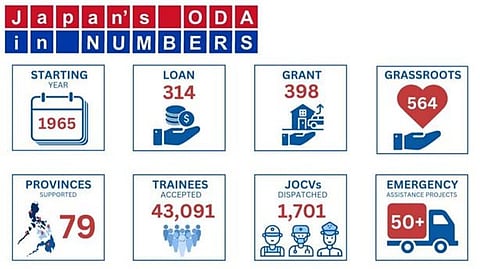
- NEWS
- the EDIT
- COMMENTARY
- BUSINESS
- LIFE
- SHOW
- ACTION
- GLOBAL GOALS
- SNAPS
- DYARYO TIRADA
- MORE

Japan has reaffirmed its role as the Philippines’ top partner in development, accounting for nearly 60 percent of the country’s total official development assistance (ODA) by 2022. Through massive investments in transport, disaster resilience, maritime safety, and human resource development, Japan’s support has remained central to the Philippines’ growth story for almost seven decades.
“Since the 1960s, Japan has been a committed partner to the Philippines, marking almost seven decades of robust bilateral relations. Our support has been vital to numerous infrastructure projects, including the Philippine-Japan Friendship Highway, NAIA Terminal 2, and San Juanico Bridge,” Japanese Ambassador Endo Kazuya said in a message.
Ambassador Endo stressed that Japan’s commitment endures through ongoing flagship projects such as the North-South Commuter Railway (NSCR), the Metro Manila Subway, and the Davao City Bypass.
“These endeavors are aimed at making transportation more comfortable and safer,” he added.
Japan’s ODA has been pivotal in upgrading the Philippines’ railway network. The 147-kilometer NSCR, which will connect Clark International Airport in Pampanga to Calamba in Laguna, is expected to serve over 800,000 daily commuters, cutting travel time from Malolos to Tutuban to just 35 minutes.
Meanwhile, the Metro Manila Subway – the country’s first underground railway – promises to halve travel time between Quezon City and the Ninoy Aquino International Airport to only 41 minutes once completed. Japan has also extended assistance in modernizing Light Rail Transit Lines 1 and 2 and rehabilitating the Metro Rail Transit Line 3.
Beyond construction, Japan has invested in railway personnel training and master planning, including a 30-year Greater Capital Region Railway Master Plan that will guide development until 2055.
Japan has also made significant contributions to the Philippines’ disaster risk reduction initiatives, such as flood control projects along the Pasig-Marikina River and in Cagayan de Oro and Cavite. These programs have lessened flooding risks and safeguarded communities.
Maritime cooperation remains another priority. Japan has provided the Philippine Coast Guard with multi-role response vessels, the largest in its fleet, enhancing its ability to conduct search and rescue, law enforcement, and environmental protection. A new agreement signed in May 2024 will add five more 97-meter vessels to the Coast Guard’s operations.
Ambassador Endo also highlighted Japan’s role in humanitarian assistance and peacebuilding. Japan has extended relief aid during major typhoons, supported the Philippines during the COVID-19 pandemic, and continues to be a partner in the Bangsamoro peace process through projects that promote human security and socio-economic development.
In addition, Japan’s cooperation has boosted agriculture, supported airport and bridge construction, advanced cybersecurity, and promoted environmental sustainability through reforestation, clean water projects, and anti-marine litter initiatives.
Human resource development remains a central pillar, with scholarship and training programs equipping thousands of Filipino leaders and professionals with technical expertise.
“Japan’s ODA has positively impacted the Philippines through improved livelihoods and safety, and quality growth,” Ambassador Endo said.
“Japan remains steadfast in its commitment to fostering a bright and prosperous partnership with the Philippines. Together, we can achieve even greater heights.”
As the Philippines prepares for continued urbanization and infrastructure expansion, Japan’s steady presence ensures that the two nations’ bond of friendship and cooperation continues to serve as a cornerstone of progress.
